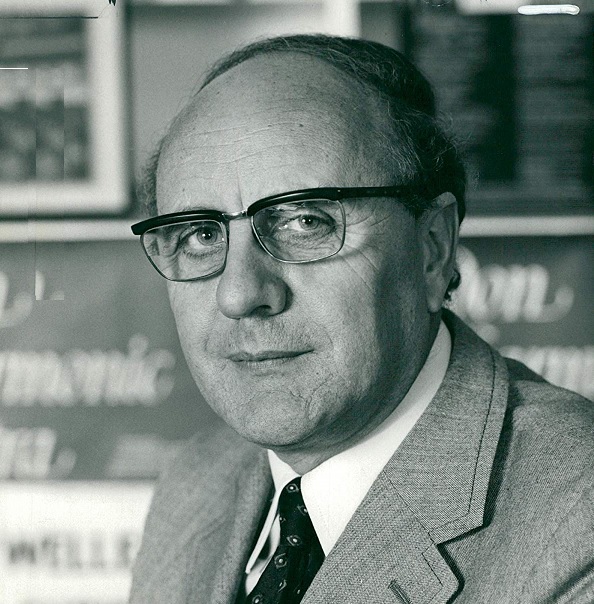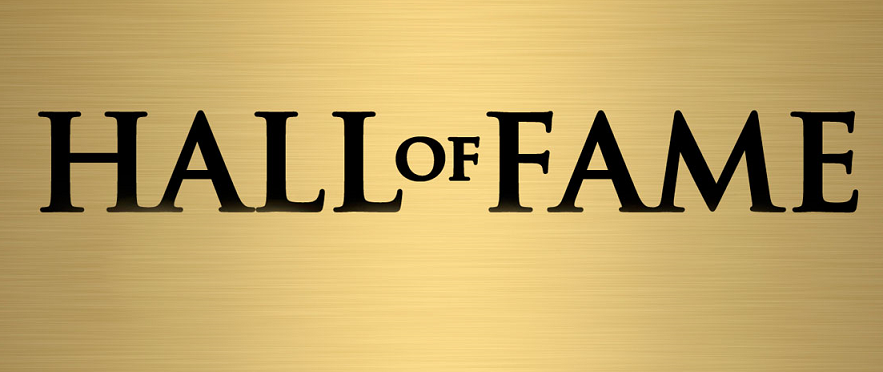
Brass band historian Tim Mutum has been asked by 4BR to curate a ‘Hall of Fame’ of players, conductors, composers, adjudicators, entrepreneurs, administrators and personalities who have helped to shape as well as drive the brass band movement from its beginning to the modern day.
Fame can be lasting and indelible or fleeting and ephemeral – from the names who appear on contest record rolls of honour to those who made contributions to greatness in other ways around the brass band globe.
Fame can be lasting and indelible or fleeting and ephemeral – from the names who appear on contest record rolls of honour to those who made contributions to greatness in other ways around the brass band globe.
The undisputed giants of Gladney, Rimmer and Mortimer will of course be included, but so too those who may not so readily be spoken of as ‘greats’ but whose contribution should without doubt be marked.
We hope you enjoy the series, which we also hope will be added to with further information about each person as we develop it further.
No 8: Eric Bravington OBE (1920 - 1982)
Eric Bravington would nowadays be a conducting anomaly in the brass band world.
A successful professional career saw him work with many of the finest musicians as a player and subsequent Managing Director of the London Philharmonic Orchestra, yet despite the obvious opportunities that this presented he remained inextricably connected with the Hanwell Band.
The link was very much an emotional one.
Hanwell was formed in 1891, with Eric’s grandfather being an early member. In 1919, his father Reginald became a player and later a respected band secretary, a role he fulfilled for the next 40 years.
Emotional link
Eric was born in Hanwell in December 1920, and by the age of 7 was enrolled in the fledgling Hanwell Junior Band. It soon grew into a successful feeder band and by the time he was 12, he was playing cornet and later flugel in the Championship Section senior band.
From 1927 Hanwell was an unbeaten London & Home Counties Association champion, and with Eric in the ranks they were winners from 1932 to 1935. His name also appeared in the band’s line-up for the British Open from 1933 to 1938 (alongside his father). He also appeared with the band at the National Final at Crystal Palace from 1932 to 1938.
His name also appeared in the band’s line-up for the British Open from 1933 to 1938 (alongside his father). He also appeared with the band at the National Final at Crystal Palace from 1932 to 1938.
In 1937 he entered the Royal College of Music as a trumpet student under Ernest Hall, recalling some years later that he was “...a great teacher and I suppose it is fair to say that most of us who were there with him found ourselves in time in the important positions at which we aimed.
We could not have had a finer teacher or father confessor”.
It led to him being appointed fourth trumpet at the London Philharmonic Orchestra (LPO), then led by Sir Thomas Beecham, although he initially found the adjustment to orchestral work difficult.
“They couldn’t hear a note I played at first”, he later said, “but I struggled on. That’s something you have to learn.”
Unbreakable link
In 1941 Bravington was drafted into the Welsh Guards. “I can’t say I enjoyed the Army life”, he said, “but let’s face it, we were lucky, we kept our playing up. A lot of people were a hell of a lot worse off.”
That perhaps explains why the connection to Hanwell also became unbreakable. Able to stay in London he rejoined the band, becoming part of the quartet that won the first two Morris Motors Band Oxford Quartet contests in 1944 and 1945.
Tellingly he said: “It was a great combination. My great regret is that it was never recorded. It gave me some of the finest enjoyment in brass playing I’ve ever experienced.” He also competed at the All England Solo Championships - coming second in 1946.
Tellingly he said: “It was a great combination. My great regret is that it was never recorded. It gave me some of the finest enjoyment in brass playing I’ve ever experienced.” He also competed at the All England Solo Championships - coming second in 1946.
After the war he faced a choice. Malcolm Arnold had retired from playing with the London Philharmonic Orchestra and they wanted Eric as first trumpet.
He was also wanted by the cash rich Philharmonia, but not for the first time his sense of loyalty saw him return from the Welsh Guards to the LPO in 1948 as principal trumpet.
Turned things around
Soon his organisational abilities came to the fore and in 1952 he became Chairman of the Board and seven years later Managing Director.
The archives of the LPO have recently released correspondence written by Eric Bravington to many star performers of the era such as the American entertainer Danny Kaye. It reveals a courteous, very specific administrator in command of every aspect of his job.
The archives of the LPO have recently released correspondence written by Eric Bravington to many star performers of the era such as the American entertainer Danny Kaye. It reveals a courteous, very specific administrator in command of every aspect of his job.
Despite its financial troubles, Bravington began turning things around - his bond with the orchestra unbreakable, despite revealing in an interview he gave with the Guardian newspaper in 1962 that in the early 1960s the orchestra “just about broke even”.
By 1979 it was reported it was making £10,000 profit a year.
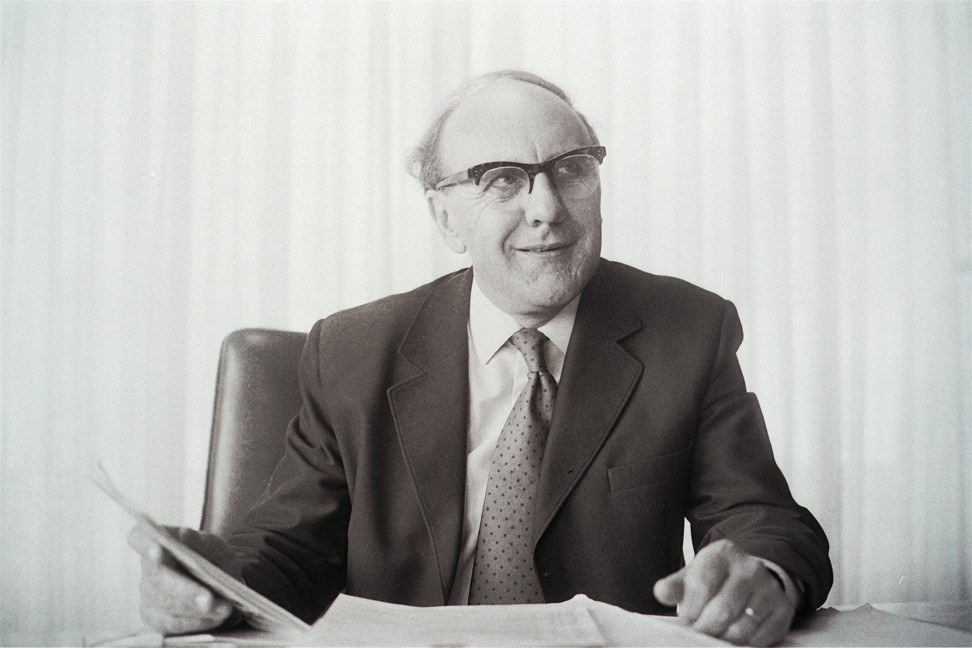
Hanwell return
His work also allowed him time to return to Hanwell Band in 1959, “because that’s where it all started”. He later revealed that it took him two years to get the sound he was looking for but, “it was worth it when it arrived.”
Hanwell soon became the pre-eminent band in the Greater London area, not only on the contest stage but also is securing high profile engagements such as the annual National Folk Music weekend at the Royal Albert Hall.
They reached their peak period under his baton from around 1965 onwards, building on a top ten finish on ‘Belmont Variations’ at the 1963 National Finals.
In 1970 they came third at the National Finals (although the contest was hived off from the World Championship) and returned to play at the British Open in 1971.
Wins came at the Area contest in 1963, 1967 and 1970, BBC Challenging Brass in 1966 and at events at Nottingham, Hastings, Reading and CISWO amongst others.
In 1970 they came third at the National Finals (although the contest was hived off from the World Championship) and returned to play at the British Open in 1971.
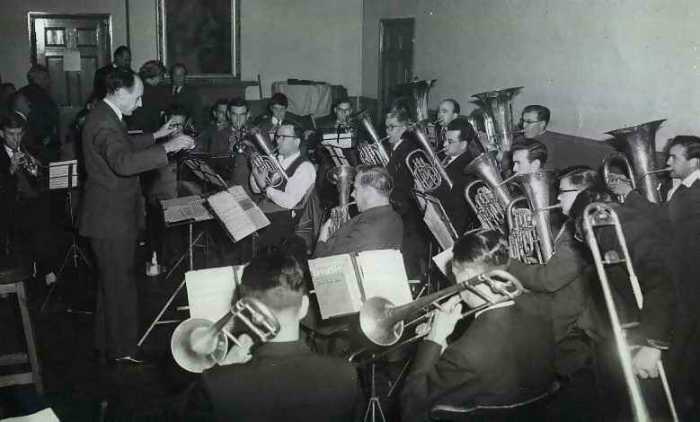
Retirement
Eric Bravington ‘retired’ after 14 years at the helm at Hanwell in January 1974 due to the increasing demands placed on him at the LPO, although he still conducted on occasions. He was appointed Band President.
In the following years success became sporadic for Hanwell, with a final victory under his leadership in 1980 playing ‘Symphony of Marches’ at Watford Town Hall.
In total he led Hanwell at 92 contests from 1949 to 1981. On each occasion he conducted with immense pride and professionalism; from the Royal Albert Hall to the smallest park bandstand concert.
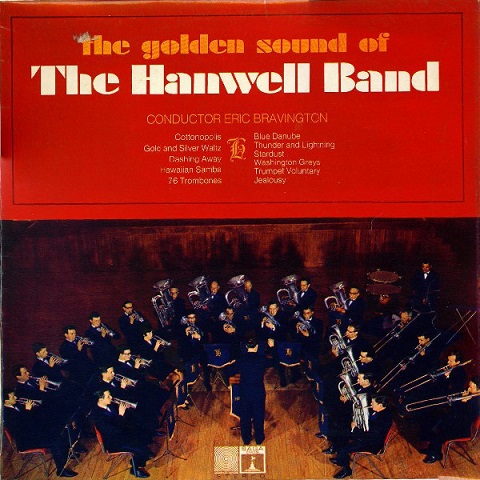
Although he could be prickly of any perceived criticism of ‘his’ band, those who knew him spoke with deep admiration.
Such was the professional respect in which he was held his appointments as an adjudicator to the National Finals, British Open, Granada Band of the Year and European Championships amongst others were met with universal approval – his precise, insightful comments revealing an acute ear for detail, style and musicality.
OBE Award
Although major brass band contest honours never came his way, in 1974 he was awarded the OBE for Services to Music following the LPO’s ground breaking concert tour to China - the first by a western orchestra since the 1949 revolution.
By the late 1970’s a severe illness kept him from his desk at the LPO for several months. His retirement in 1980 was followed by further inactivity, and he was unable to led Hanwell to the 1982 regional contest.
Harry Mortimer said that his death left “another gap in the ‘greats’ of our brass band world”, whilst Walter Hargreaves added that the movement had lost “a fine musician and a real gentleman”.
On 21st August 1982 Eric Bravington passed away in a Sue Ryder Home at the age of just 61. His wife Pam and two daughters donated some of his instruments to raise funds to help young players.
Harry Mortimer said that his death left “another gap in the ‘greats’ of our brass band world”, whilst Walter Hargreaves added that the movement had lost “a fine musician and a real gentleman”.
It was a fitting epitaph for a man whose loyalty as well as talent was fully appreciated by those who worked and knew him. It meant much more than any entry in the record books of the major championships.
Tim Mutum
4BR Hall of Fame: No.1: Jack Atherton
https://www.4barsrest.com/articles/2019/1832.asp
4BR Hall of Fame: No.2: Albert Baile
https://www.4barsrest.com/articles/2019/1836.asp
4BR Hall of Fame: No.3: Stanley Boddington
https://www.4barsrest.com/articles/2019/1842.asp
4BR Hall of Fame: No.4: Bram Gay
https://www.4barsrest.com/articles/2020/1848.asp
4BR Hall of Fame: No.5: Leonard Lamb
https://www.4barsrest.com/articles/2020/1855.asp
4BR Hall of Fame: No.6: Arthur Stender
https://www.4barsrest.com/articles/2020/1866.asp
4BR Hall of Fame: No.7: Violet Brand
https://www.4barsrest.com/articles/2020/1871.asp



